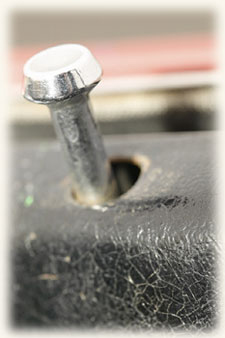
I have been quite fortunate during my lifetime to have had almost no experience with crime. Sure, I’ve set fire to a couple of abandoned warehouses, who hasn’t? But I haven’t been the victim of major theft nor violence.
So perhaps my experience in the area of personal security means I should keep my trap shut on the following observations, but I’m not gonna.
During my formative years (which ended last Tuesday), cars had locks on their doors that required the pushing or pulling of a knob. Rare wealthy folk had locks that were operated by electricity and other forms of witchcraft. But for the most part, when you got out of your car at the Kmart, you pushed the knob down and the door was locked.
And we liked it. It was easy. At a glance you could tell if the door was locked or unlocked. And even if you had the electric locks, the principle was the same.
Seemingly overnight the remote radio-controlled locks came on the scene. One might be tempted to think that they are a frivolous luxury meant to appeal to the blue-hair set, quick to show off their new Pontiac in the hopes that Mabel might mistake it for a Mercedes. But I think these remote controls are terribly useful. If you live in a climate with nasty weather, like my native Michigan, getting the doors unlocked without having to fumble with a key and break the ice that has formed over the key-hole, is more than a mere convenience. The use of the remote control unlock feature has saved countless fingers and noses.
The handy remotes also have the ability to unlock the trunk which is another great advantage to modern life. And finally, these devices have the panic button which sets off the alarms, horns, lights and other annoyances that go totally ignored. Of course, when you set them off accidentally everyone looks your way and thinks “What an idiot.” But when the hoodlum has his machette at your throat everyone goes deaf and dumb in an instant. So the jury remains out on the usefulness of that feature.
But what I fail to understand is the logic, if indeed it exists, behind making the car “chirp” when using the remote to lock the car. Sure, I’ve just pressed this button and I’m not sure if the car “heard” me and actually locked the doors. And since I’m carrying my life savings in small bills, flying around in the back seat, I want to make damn sure those doors are locked. And the fact that I’ve left my two-year-old son in the car to guard the cash isn’t good enough — I want the doors locked!
Of course this irritation isn’t new. It’s been going on for years. But today I was sitting in my truck, in a large mall parking lot, and over the course of 10 minutes, nearly a dozen people parked, got out of their vehicle and started to walk away. They then pointed their remote device (this “pointing” action always amuses me…like they’re afraid they may innadvertently lock the car NEXT to theirs) and press the “lock” button. The car horn sounds off! How are other drivers supposed to nap with all that racket going on? Why? WHY? We have enough pollution, of all kinds, we don’t need the horn to honk to tell us we’ve locked the car. Flash the lights if you need some cue that the task has been accomplished. But don’t alert the mother ship every time you press that button!
And isn’t it interesting that, it would seem, every auto manufacturer on the orb has come up with the same brilliant method? It doesn’t matter if you have a $9,000 Hyundai or a $40,000 Lexus — press that “lock” button on the keyfob and you’re going to be jolted with annoying noise.
Now, I could simply blame the manufacturers for bad design. And I do. But I blame my fellow upright-walkers more. You’re getting out of your car. Your hand is on the “open-the-door-thingy”. What else is RIGHT THERE? What’s the other closest control? The locks! And they’re electric! And they are in the form of a simple button/lever!! Why not just lock the damn doors!? It’s quiet. You can hear and see them function. You can know they’re locked. You pretend to be smart, intelligent and thoughtful.
Oh, yeah, right. Sorry ’bout that. I wasn’t thinking.